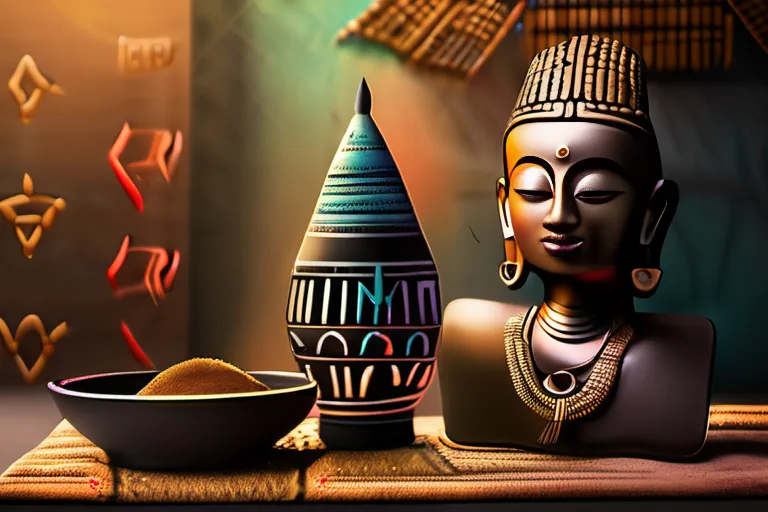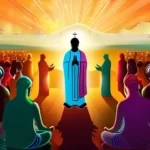Explore the rich history, beliefs, and practices of Ifa religion in this detailed guide.
Ifa religion, also known as Yoruba traditional religion, is one of the oldest religions in West Africa. This article provides a comprehensive overview of its history, beliefs, and practices.
The Origins of Ifa Religion
Imagine tracing back through time, to a place where ancient wisdom and spiritual practices intertwine seamlessly—this is the essence of Ifa religion. Born among the Yoruba people in what is now Nigeria, Ifa religion has roots that delve deep into a rich tapestry of history and culture. How did it all begin? Could it be that the stories told by griots, the wise storytellers of West Africa, hold clues to its origins?
The term ‘Ifa’ itself is quite intriguing; it often refers to a collection of oral traditions and divination practices. But what exactly are these ancient wisdoms that have stood the test of time? Some say they date back to the 12th century, when the Yoruba people were navigating their way through a complex social landscape. Could it be that Ifa religion was a response to the need for guidance and understanding in those early days?
Central to Ifa is the concept of divination through ifá, a system of sacred verses believed to offer insight into one’s destiny and provide answers to life’s questions. These verses are recited by priests known as babalawo. But what kind of wisdom do these verses hold? Are they mere stories, or do they carry the weight of centuries-old knowledge?
The practice of Ifa goes beyond divination; it involves spiritual rituals and offerings to deities. These rituals are not just ceremonial acts but are deeply connected to maintaining balance in one’s life and community. How does making an offering, such as food or cloth, help in navigating the complex web of relationships between humans and the divine?
Ifa religion is a living tradition, with its practices adapting over time while still honoring ancient wisdom. It serves not only as a guide for personal spiritual growth but also as a social framework that emphasizes communal harmony. Can we see this balance reflected in the way Ifa practitioners interact within their communities today?
Beliefs and Practices in Ifa Religion
Exploring the core beliefs and practices of Ifa religion takes us on a journey through its rich tapestry of spiritual life, where rituals and offerings intertwine to create a vibrant cultural fabric.
Have you ever wondered how ancient wisdom guides daily life? In Ifa religion, divination plays a crucial role. Through the practice of ifè, priests known as Babalawos or Iyanetan use sacred beads to seek guidance and advice from the gods. This process is not just about reading the future; it’s a deep dive into understanding one’s life path, making decisions, and seeking divine intervention.
The practice of ifè involves interpreting verses from the sacred books called Odu Ifa. These verses are like ancient maps, providing wisdom and guidance through various life situations. Through this ritual, individuals can gain insights into their past, present, and future, fostering a deeper connection with their spiritual guides.
Offerings are another vital part of Ifa practice. Do you know what kind of offerings are typically made? Common items include palm oil, kola nuts, yams, and various herbs. These offerings serve as a way to communicate with the gods and spirits, seeking their blessings for good fortune and protection. The act of offering is not just about giving; it’s an exchange that strengthens the relationship between human and divine realms.
Moreover, spiritual rituals in Ifa religion often involve ancestral veneration. Ancestors are highly respected and revered for their wisdom and guidance. Rituals to honor them can include feasts, storytelling, and performances of traditional dances. These practices help maintain the continuity between generations, ensuring that ancestral knowledge is passed down and honored.
Through these beliefs and practices, Ifa religion provides a holistic approach to spiritual life, blending practical guidance with deep metaphysical insights. It’s a vibrant blend of tradition and contemporary relevance, making it a living and dynamic force in the lives of many practitioners today.
The Role of Odu Ifa in Ifa Religion
Imagine Ifa religion as a vast library, where every book holds profound wisdom and secrets about life itself. At the heart of this library are the Odu Ifa, ancient verses that form the foundation of Ifa’s teachings. These sacred texts are not just words on pages; they are living entities that guide individuals through their spiritual journeys.
Each Odu is like a chapter in a story, each telling its own unique tale. Together, they create a comprehensive narrative that addresses every aspect of human existence—birth, life, illness, and death. These verses are believed to contain the knowledge of the divine, passed down through generations by wise Babalawos and Iyanifas.
The Odu Ifa play a crucial role in divination rituals, where the Babalawo or Iyanifa reads the verses to understand the will of the ancestors. This process is like peeling back layers of an onion, revealing deeper truths about one’s destiny and the best course of action.
But what exactly are these Odu? They are not just any texts; they are a sacred language that connects the physical world with the spiritual realm. Each Odu has its own unique meaning and is associated with specific deities and natural elements, making it a complex yet beautiful system of divination and wisdom.
Through the study and interpretation of these Odu, practitioners gain insights into their lives, helping them navigate through challenges and find balance in their spiritual paths. It’s like having a map that shows you not just where you are, but also where you’re heading and how to get there.
The significance of Odu Ifa lies in their ability to provide guidance and understanding for all aspects of life. Whether it’s seeking advice on personal matters or making important decisions, the wisdom contained within these verses serves as a beacon of light, illuminating the path forward with divine insight and clarity.
Ifa Priesthood: The Babalawo and Iyanifa
Imagine Ifa religion as a vast, intricate tapestry woven with threads of wisdom and tradition. At its heart lie the roles of two essential priesthoods: the Babalawo (male priests) and the Iyanifa (female priests). These priestly roles are not just positions but profound spiritual journeys that shape the very essence of Ifa practice.
Let’s delve into the Babalawo. Much like guardians of a sacred garden, Babalawos are custodians of ancient knowledge. They possess deep understanding and experience in divination through the use of beads, shells, and other sacred items. These rituals, known as ifa, offer guidance on personal and communal issues. The Babalawo’s role is to mediate between the spiritual world and humanity, ensuring that the wisdom of Ifa reaches those who seek it.
- Initiation: Becoming a Babalawo is no small feat; one must undergo rigorous training and initiation rites. This process involves deep study, moral guidance, and often, periods of seclusion to connect with the divine.
- Roles in Community: Beyond divination, Babalawos play crucial roles in community leadership. They are trusted counselors, mediators, and sometimes even judges in traditional Yoruba courts. Their wisdom is highly valued and sought after for its ability to bring clarity and harmony.
- Cultural Significance: The Babalawo’s role extends beyond the spiritual realm; they are key figures in preserving Ifa traditions and passing them on to future generations. Through their teachings, the rich heritage of Yoruba culture is safeguarded.
Now, let us explore the Iyanifa. Just as the Babalawo represents a pillar of masculine strength, the Iyanifa embodies feminine wisdom and nurturing energy. Their role in Ifa religion is equally vital but often underappreciated due to societal biases. Iyanifas are deeply involved in healing rituals, herbal medicine, and spiritual counsel.
- Healing Practices: Iyanifas are revered for their skills in traditional medicine. They use herbs, prayers, and divination to treat both physical ailments and spiritual imbalances. Their knowledge of natural remedies and spiritual practices is extensive and highly respected within the community.
- Spiritual Guidance: In addition to healing, Iyanifas offer guidance on personal growth and spiritual development. They are often sought out for their insights into life’s challenges and how to navigate them with grace and understanding.
- Cultural Influence: The Iyanifa contribute significantly to the cultural fabric of Ifa religion. Their roles in festivals, ceremonies, and community events reflect a deep integration of spiritual and social responsibilities. Through their actions, they embody the balance and harmony that are central to Yoruba beliefs.
The roles of Babalawos and Iyanifas in Ifa religion are interconnected yet distinct, much like the yin and yang in Chinese philosophy. Together, they form a harmonious whole, ensuring the continuity and richness of this ancient faith. By understanding their roles, we gain insight into the deep spiritual practices that have shaped Yoruba culture for centuries.
The Influence of Ifa Religion on Yoruba Culture
Imagine Ifa religion as a vibrant tapestry, intricately woven through the very fabric of Yoruba culture. How has this ancient wisdom influenced the cultural identity of the Yoruba people? The answer lies in its profound impact on various aspects of their lives—art, music, and social structures.
Art in the Yoruba world is not just about aesthetics; it’s a window into the spiritual beliefs and narratives that shape daily life. Consider the iconic ofun, or Ifa divination trays, which are intricately carved with symbols representing different deities and prophecies. These artifacts are more than mere decorative items—they serve as sacred tools in understanding one’s destiny. Can you imagine a Yoruba village without such symbols that echo the ancient wisdom of Ifa?
Music, too, is deeply intertwined with Ifa beliefs. The djembe drum, for instance, resonates with the rhythms of creation and divine communication. During ceremonies and rituals, the sounds of these drums carry messages to the ancestors, invoking their blessings and guidance. How many times have you witnessed a ceremony where the music seems to speak directly to your soul?
Social structures in Yoruba communities are also influenced by Ifa teachings. The concept of Orisha, or deities, guides social norms and values. For example, respect for elders is not just about age; it’s a reflection of their wisdom passed down through generations. How do you think your community might change if these spiritual principles were less influential?
In essence, Ifa religion has shaped the cultural identity of the Yoruba people in ways that are both subtle and profound. From the art that adorns walls to the music that fills the air during festivals, and the social norms that govern daily interactions, every aspect is intertwined with this ancient spiritual practice.
So next time you step into a Yoruba community, remember that what you see, hear, and feel are all manifestations of the deep-rooted influence of Ifa religion. It’s not just a set of beliefs but a living, breathing entity that continues to guide and shape the lives of millions.
The Future of Ifa Religion
The future of Ifa religion looms like a distant mountain, its peaks veiled by clouds of uncertainty and promise. How will this ancient wisdom adapt to the fast-paced world of today? As we consider the current state of Ifa, one cannot help but wonder if it will fade into obscurity or thrive amidst modern challenges.
The traditional practices of Ifa are deeply intertwined with daily life in Yoruba communities. Yet, as globalization and urbanization reshape societies, the younger generation faces a dilemma: embrace the familiar traditions or venture into the unknown realms of contemporary culture? This question echoes through the streets, challenging the very fabric of Ifa’s continuity.
Efforts to preserve Ifa’s rich heritage are underway, with some communities adopting innovative strategies. Cultural festivals and workshops now celebrate the wisdom of Oba Ife (the Oracles), drawing crowds from near and far. These events serve as a bridge between past and present, ensuring that the teachings of Ifa remain alive in both heart and mind.
Moreover, digital platforms are opening new avenues for dissemination. Online forums and social media groups connect practitioners worldwide, fostering a global community where knowledge can flow freely. This modernization is crucial; it ensures that Ifa’s insights reach beyond geographical boundaries, inspiring people across continents with its timeless philosophies.
However, the future of Ifa Religion also faces challenges. How will it maintain its authenticity amidst rapid change? Will it remain a private practice or open up to broader acceptance in mainstream society? These are questions that test the resilience and adaptability of this ancient belief system.
The journey ahead is not without obstacles, but with every step forward, Ifa Religion proves its enduring relevance. It continues to offer guidance in navigating life’s complexities, from personal troubles to communal struggles. As we look towards the horizon, one thing becomes clear: Ifa will survive and perhaps even flourish, adapting gracefully while preserving its core essence.
Will you, too, find yourself drawn into this ancient yet ever-relevant wisdom? The choice is yours—a journey of discovery awaits those who dare to explore the depths of Ifa’s teachings.
Conclusion
 In conclusion, Ifa religion plays a significant role in the cultural identity of the Yoruba people. Understanding its unique aspects can provide valuable insights into African spirituality.
In conclusion, Ifa religion plays a significant role in the cultural identity of the Yoruba people. Understanding its unique aspects can provide valuable insights into African spirituality.











